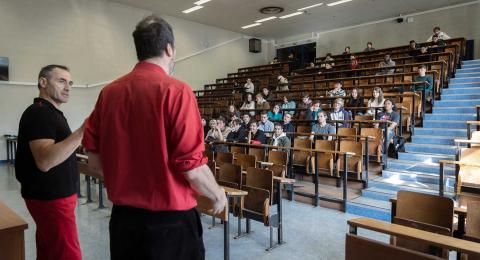Information
Objectives
The Master 2 Intellectual Property and Business Law (M2 PIDAN) trains students to deal with current and future legal challenges linked to the growth of information technologies. It explores both the theoretical issues and the contractual, legal and technical practices of the sector to meet growing demands in the contemporary practice of national, European and international business law. Students will learn to identify legal strategies to promote “digital” and “intellectual” corporate heritage.To this end, the seminar programme combines basic training in business law and specialised courses for intellectual property and digital law. The programme also focuses on acquiring additional interdisciplinary knowledge, for example in the digital and economic fields. Also, some courses are given in English. Depending on their career plan, students can choose to specialise either in intellectual property law or in digital law through various optional subjects and individual work.This Master’s degree will help students develop the skills essential to professional practice and rapid recruitment. They will complete an internship and practical exercises (contract negotiation, production of writing games, participation in advocacy contests).This Master 2 also prepares students for a PhD course by encouraging individual research (writing of a Research Master thesis) and collective research (during each seminar). The students will also learn to master research tools – in particular legal databases – and be able to participate in many scientific events.
Career Opportunities
Career prospects
Juriste d’entreprise ou conseil spécialisé dans les domaines concernés
Juriste ou conseil junior spécialisées dans les domaines concernés
Conseil junior en propriété industrielle, chargé d’affaires en valorisation
Délégué à la protection des données
Chargé d’affaires publiques dans les domaines concernés
Chargé d’affaires réglementaires dans les domaines concernés
Juriste d’entreprise ou conseil junior en intelligence économique
Responsable de systèmes d’information
Sous réserve de réussite au concours de la fonction publique, les diplômés pourront accéder à des postes d'ingénieur d’étude ou chercheur au sein d’un organisme national de recherche
Sous réserve de réussite à l’examen du CRFPA : avocat
Further Study Opportunities
Les étudiants peuvent effectuer une poursuite d’études à école du barreau, école de la magistrature, formations complémentaires en management de l’innovation, Doctorat
Fees and scholarships
The amounts may vary depending on the programme and your personal circumstances.
Capacity
Available Places
Target Audience and Entry Requirements
The programme is intended primarily for students who have acquired legal training and who demonstrate a specific interest in digital law and intellectual property law. It welcomes international students who are fluent in French. It is also open to engineering students and applicants from business or political science schools (Acquis Validations
- validated credits). Selection on a case-by-case basis (including a motivation questionnaire) and interview with a panel. Procedure available on the University of Paris-Saclay website:https://apply-tc.ecp.fr
Application Period(s)
From 15/04/2026 to 15/06/2026
Supporting documents
Compulsory supporting documents
Motivation letter.
Motivational questionnaire.
All transcripts of the years / semesters validated since the high school diploma at the date of application.
M2 Summary Sheet.
Curriculum Vitae.
Detailed description and hourly volume of courses taken since the beginning of the university program.
Additional supporting documents
Certificate of French (compulsory for non-French speakers).
VAP file (obligatory for all persons requesting a valuation of the assets to enter the diploma).
Supporting documents :
- Residence permit stating the country of residence of the first country
- Or receipt of request stating the country of first asylum
- Or document from the UNHCR granting refugee status
- Or receipt of refugee status request delivered in France
- Or residence permit stating the refugee status delivered in France
- Or document stating subsidiary protection in France or abroad
- Or document stating temporary protection in France or abroad.









